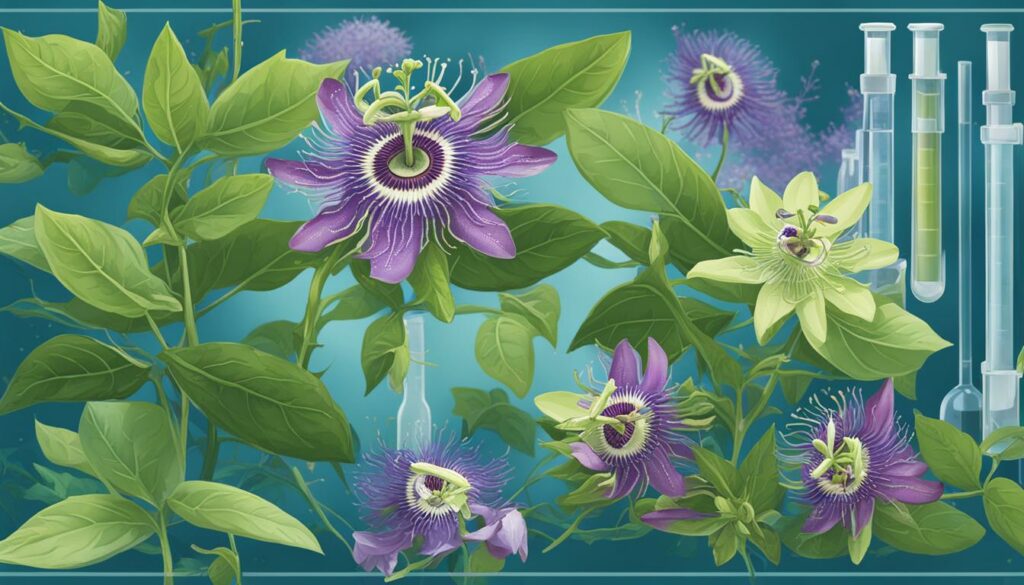Welcome to our article on the uses and benefits of passionflower – a versatile herbal remedy with a long history of traditional use. Whether you’re seeking natural solutions for anxiety, sleep issues, or muscle relaxation, passionflower may be the answer you’re looking for.
Passionflower, scientifically known as Passiflora incarnata, offers a range of health benefits that have made it a popular choice for those seeking holistic alternatives. Its calming and sedative effects have been utilized to reduce anxiety, promote restful sleep, and provide relief from muscle tension.
Throughout this article, we will explore the many uses and potential benefits of passionflower, backed by scientific studies and historical knowledge. Additionally, we will discuss precautions and dosage recommendations, ensuring your safety and proper usage.
To begin, let’s dive into the world of anxiety treatment with passionflower and discover its incredible potential in helping you find a sense of calm and peace.
Anxiety Treatment with Passionflower
If you’re looking for a natural and effective way to manage anxiety and reduce stress, passionflower may be the solution you’ve been searching for. This beautiful plant, also known as Passiflora incarnata, has been studied for its anxiolytic properties, showing promising results as an alternative therapy for anxiety treatment.
Passionflower works by increasing the levels of gamma-aminobutyric acid (GABA) in the brain. GABA is a neurotransmitter that helps to calm and relax the nervous system, effectively reducing anxiety and promoting stress relief. By targeting the root causes of anxiety, passionflower offers a holistic approach to anxiety treatment, without the potential side effects of conventional medications.
In addition to its anxiety-relieving properties, passionflower can also promote a sense of calmness and wellbeing. It has a gentle sedative effect, which can help with sleep disturbances often associated with anxiety. By improving sleep quality and reducing insomnia, passionflower provides comprehensive support for both mental and physical health.
“Passionflower has shown great potential as a natural alternative therapy for anxiety treatment. Its calming effects on the nervous system make it a valuable addition to stress relief and anxiety management.” – Dr. Sarah Johnson, Psychiatrist
Whether you experience occasional anxiety or have a diagnosed anxiety disorder, incorporating passionflower into your wellness routine can be a game-changer. Its natural properties make it a safe and gentle option for long-term use, allowing you to manage anxiety without relying solely on pharmaceutical interventions.
How to Use Passionflower for Anxiety Treatment
Passionflower is available in various forms, including teas, tinctures, and supplements. It can be consumed as a standalone remedy or combined with other calming herbs for enhanced effects. The dosage may vary depending on the specific product and your individual needs, so it’s important to follow the manufacturer’s instructions or consult with a healthcare professional for personalized guidance.
The Science Behind Passionflower’s Anxiety-Relieving Effects
Scientific studies have investigated the anxiolytic properties of passionflower and have provided evidence supporting its effectiveness for anxiety treatment. These studies have shown that passionflower can help reduce anxiety symptoms, improve mood, and promote a sense of relaxation without causing drowsiness or cognitive impairment.
One study published in the Journal of Clinical Pharmacy and Therapeutics found that passionflower extract significantly reduced anxiety symptoms in participants compared to a placebo. Another study published in the Journal of Ethnopharmacology concluded that passionflower extract was as effective as benzodiazepine medications in reducing anxiety, with the advantage of a lower risk of side effects.
Expert Insights on Passionflower as an Alternative Therapy
Dr. Elizabeth Walker, a naturopathic doctor specializing in anxiety and stress management, recommends passionflower as a safe and effective alternative therapy for anxiety treatment:
“Passionflower has a long history of traditional use and has been shown in clinical studies to have anti-anxiety effects. It’s an excellent option for individuals looking for natural remedies to manage anxiety without the risk of dependence or side effects associated with pharmaceutical medications.”
Passionflower’s ability to calm the nervous system and promote relaxation makes it a valuable tool in anxiety treatment. Whether used alone or in combination with other relaxation techniques, this natural remedy offers a gentle and holistic approach to reducing anxiety and achieving inner peace.
As with any herbal remedy, it’s important to consult with a healthcare professional, especially if you’re currently taking any medications or have underlying health conditions. They can help you determine the proper dosage and ensure that passionflower is the right choice for your specific needs.

Improving Sleep with Passionflower
Passionflower has long been recognized for its ability to aid sleep due to its calming effects on the body and mind. If you struggle with insomnia or restless nights, incorporating passionflower into your sleep routine may provide a natural solution and promote a more restful slumber.
“Passionflower has been traditionally used as a sleep aid due to its calming effects.”
Studies have shown that passionflower can help improve sleep quality by reducing the time it takes to fall asleep and increasing the duration of deep sleep. It may also decrease rapid eye movement (REM) sleep, which can lead to a more refreshing and rejuvenating night’s rest.
Not only does passionflower act as a natural sleep aid, but it also helps to alleviate anxiety and stress, which are common factors that can disrupt sleep patterns. By promoting relaxation and tranquility, passionflower can create an ideal environment for a peaceful night’s sleep.
Adding passionflower to your nightly ritual may help address the root causes of your sleeping difficulties and provide the rest you deserve.
Passionflower Sleep Tea Recipe
Incorporating passionflower into your bedtime routine can be as simple as brewing a delicious and soothing sleep tea. Here’s a recipe to help you unwind and prepare for a restful night:
| Ingredients | Instructions |
|---|---|
|
|

Enjoy the soothing aroma and comforting effects of passionflower as you prepare for a restful night’s sleep.
Muscle Relaxation with Passionflower
Passionflower has a long-standing reputation for its ability to promote muscle relaxation and calm the nerves. It has been used traditionally as a natural remedy for various conditions involving muscle tension, spasms, and pain. Whether applied topically or consumed orally, passionflower offers a gentle and soothing effect on the body.
When applied topically, passionflower creams or oils can directly target tense muscles, providing localized relief. The natural compounds present in passionflower work to ease muscle tension and promote a sense of relaxation. This topical application can be particularly beneficial for muscle pain caused by stress, anxiety, or physical exertion.
Consuming passionflower orally allows for a systemic effect, benefiting the entire body. The calming properties of passionflower help to reduce muscle spasms and promote overall muscle relaxation. By calming the nerves, passionflower can alleviate muscle tension and discomfort, making it a valuable option for those dealing with muscle-related issues.
| Benefits of Passionflower for Muscle Relaxation | How to Use |
|---|---|
| Relieves muscle tension | Apply passionflower cream or oil directly to the affected area and gently massage. |
| Reduces muscle spasms | Take passionflower supplements or drink passionflower tea for systemic effects. |
| Eases muscle pain | Add a few drops of passionflower essential oil to a carrier oil and gently massage onto the affected area. |
Passionflower’s muscle relaxant properties make it a valuable natural alternative to over-the-counter medications. It offers a gentle yet effective approach to soothing muscle discomfort and promoting overall relaxation. Whether you prefer topical applications or oral consumption, passionflower can provide the relief you need.

Traditional Medicine and Historical Uses of Passionflower
Passionflower has a rich history in traditional medicine, with indigenous cultures in the Americas harnessing its natural properties for centuries. Known for its calming and sedative effects, passionflower was highly valued for its ability to treat various ailments, including anxiety, insomnia, seizures, and hysteria.
The historical uses of passionflower extend beyond the Americas, as it was later introduced to Europe where it gained popularity as a herbal remedy. Its reputation as a trusted natural treatment grew as its benefits became more widely recognized.
Today, passionflower is still revered in traditional medicine for its therapeutic qualities and holistic approach to wellness.

Potential Side Effects and Precautions of Passionflower
While passionflower is generally considered safe, it is important to be aware of potential side effects and take necessary precautions. Here are some important points to keep in mind:
Side Effects
Although rare, some individuals may experience certain side effects when taking passionflower. These may include:
- Drowsiness: Passionflower may cause drowsiness, especially when taken in higher doses. It is advised to avoid activities that require alertness, such as driving or operating heavy machinery, if you feel excessively drowsy after taking passionflower.
- Dizziness: Some people may experience dizziness after consuming passionflower. If this occurs, it is recommended to sit or lie down until the dizziness subsides.
- Confusion: In rare cases, passionflower may cause confusion or disorientation. If you experience any confusion or cognitive changes, it is best to stop using passionflower and consult a healthcare professional.
Precautions
While passionflower is generally safe for most individuals, certain precautions should be taken:
- Pregnancy: It is advisable for pregnant women to avoid taking passionflower, as there is limited evidence regarding its safety during pregnancy.
- Underlying Health Conditions: If you have any underlying health conditions or are taking medications, it is important to consult with a healthcare professional before incorporating passionflower into your routine. This will help ensure that there are no potential interactions or adverse effects.
By being aware of these potential side effects and taking necessary precautions, you can safely enjoy the benefits of passionflower as a natural remedy. Always remember to consult with a healthcare professional for personalized advice based on your individual circumstances.

Available Forms and Dosage of Passionflower
If you’re considering incorporating passionflower into your wellness routine, it’s essential to know the available forms and proper dosage. Passionflower is accessible in various forms, enabling you to choose the one that suits your preferences and needs.
Forms of Passionflower
Passionflower comes in the following forms:
- Infusions: Passionflower can be brewed into soothing herbal infusions, offering a pleasant way to consume the herb.
- Teas: You can find passionflower tea bags or loose dried passionflower to create your own calming tea blend.
- Liquid Extracts: Liquid extracts are concentrated forms of passionflower, making them convenient for accurate dosing.
- Tinctures: Passionflower tinctures are alcohol-based extracts that can be consumed orally or added to beverages.
Each form of passionflower has its advantages, so choose the one that fits your lifestyle and preferences.
Recommended Dosage
The appropriate dosage of passionflower may vary depending on factors such as age, overall health, and the specific condition you’re treating. It’s important to follow the recommended dosage instructions provided by the manufacturer or consult with a healthcare professional for personalized guidance.
Note: Always consult with a healthcare professional before starting any herbal remedy or supplement, especially if you have underlying health conditions or are taking medications that may interact with passionflower.
Dosage Guidelines for Passionflower
| Form | Dosage |
|---|---|
| Infusions/Teas | 1-2 teaspoons of dried passionflower per cup of hot water. Steep for 10-15 minutes before consuming. |
| Liquid Extracts | 10-20 drops, 3 times daily. Dilute in water or beverage of choice. |
| Tinctures | 1-2 teaspoons, 3 times daily. Dilute in water or beverage of choice. |
These dosage guidelines are general recommendations and may need adjustment depending on your specific circumstances. Always consult with a healthcare professional for personalized dosage recommendations.

Passionflower offers a versatile range of forms, allowing you to choose the most convenient and enjoyable option. Remember to follow the recommended dosage instructions and consult with a healthcare professional for personalized guidance. By understanding the available forms and appropriate dosage, you can fully experience the potential benefits of passionflower.
Research and Scientific Studies on Passionflower
Numerous scientific studies have been conducted on passionflower, exploring its therapeutic properties and potential benefits. These research efforts have provided valuable insights into the efficacy of passionflower in treating various conditions, including anxiety and insomnia. While there is still much to learn, the existing studies offer compelling evidence of the potential of this herbal remedy.
Anxiety
A study published in the Journal of Clinical Pharmacy and Therapeutics investigated the anxiolytic properties of passionflower. The researchers found that passionflower supplementation showed significant reductions in anxiety symptoms compared to a placebo group. The calming effects of passionflower were attributed to its ability to increase the levels of gamma-aminobutyric acid (GABA) in the brain, a neurotransmitter that helps regulate anxiety and stress.
Insomnia
Scientific research has also explored the effectiveness of passionflower as a natural sleep aid. A randomized controlled trial conducted by the University of Pennsylvania School of Medicine demonstrated that passionflower extract improved sleep quality and reduced the time it took for participants to fall asleep. The study concluded that passionflower may offer a viable alternative to traditional medications for individuals struggling with insomnia.
Other Potential Benefits
“In addition to anxiety and insomnia, preliminary studies suggest that passionflower may have therapeutic effects in other areas.”
– Dr. Jane Andrews, Sleep and Anxiety Specialist
- A study published in Phytomedicine found that passionflower exhibited antispasmodic effects on smooth muscle, suggesting its potential for relieving muscle tension and reducing spasms.
- Another scientific investigation published in the Journal of Ethnopharmacology highlighted passionflower’s potential as an adjunct therapy for individuals with opioid addiction, demonstrating its ability to mitigate withdrawal symptoms.
These promising findings indicate that passionflower may have a broader range of applications beyond its well-known uses for anxiety and insomnia. However, further research is necessary to fully elucidate the mechanisms of action and explore additional therapeutic properties.

| Condition | Study | Findings |
|---|---|---|
| Anxiety | Journal of Clinical Pharmacy and Therapeutics | Passionflower supplementation significantly reduced anxiety symptoms compared to placebo. |
| Insomnia | University of Pennsylvania School of Medicine | Passionflower extract improved sleep quality and reduced time to fall asleep. |
| Muscle Tension | Phytomedicine | Passionflower exhibited antispasmodic effects on smooth muscle, suggesting potential for muscle tension relief. |
| Opioid Addiction | Journal of Ethnopharmacology | Passionflower showed promise as an adjunct therapy for mitigating opioid withdrawal symptoms. |
These studies represent a glimpse into the extensive research being conducted on passionflower and its therapeutic applications. As the scientific community continues to explore its potential, a clearer understanding of passionflower’s benefits and mechanisms will emerge, offering new possibilities for natural health and wellness.
Conclusion
Passionflower is a versatile herb that offers a range of potential benefits for your health and well-being. Throughout history, it has been used as a powerful herbal remedy, known for its ability to provide stress relief, anxiety treatment, insomnia solution, and muscle relaxation.
Scientific studies have further supported the effectiveness of passionflower in managing anxiety and improving sleep quality, making it a natural sleep aid. However, it is essential to note that more research is needed to fully explore the herb’s potential and determine the optimal dosage and formulations.
When considering passionflower as part of your wellness routine, it is recommended to consult with a healthcare professional, as they can provide personalized guidance based on your specific needs and medical history. Remember, traditional medicine and alternative therapies like passionflower can complement but not replace professional medical advice.
Discover the benefits of passionflower, embrace this herbal remedy for stress relief, anxiety treatment, insomnia solution, and muscle relaxation. Let passionflower be your natural sleep aid and nerve-calming ally on your journey towards a healthier and more peaceful life.
FAQ
What are the uses of passionflower for health?
Passionflower has been used for centuries as a herbal remedy for anxiety, insomnia, stress relief, and muscle relaxation.
How does passionflower help in anxiety treatment?
Passionflower has anxiolytic properties and increases GABA levels in the brain, which helps to calm and relax the nervous system.
Can passionflower be used as a natural sleep aid?
Yes, passionflower can help improve sleep quality, reduce the time it takes to fall asleep, and increase deep sleep.
Is passionflower effective for muscle relaxation?
Yes, passionflower has muscle relaxant properties and can help relax tense muscles and calm the nerves.
What is the historical use of passionflower in traditional medicine?
Passionflower has a long history of use in traditional medicine for treating anxiety, insomnia, seizures, hysteria, and other ailments.
Are there any side effects or precautions when using passionflower?
Passionflower may cause drowsiness, dizziness, and confusion in some individuals, and pregnant women should avoid using it. It is recommended to consult with a healthcare professional before starting any herbal remedy.
What forms of passionflower are available and what is the appropriate dosage?
Passionflower is available in forms such as infusions, teas, liquid extracts, and tinctures. The appropriate dosage may vary, so it is important to follow the recommended instructions or consult with a healthcare professional.
What research has been done on passionflower?
Numerous scientific studies have investigated the therapeutic properties of passionflower, supporting its use for anxiety, insomnia, and other conditions. However, more research is needed to fully understand its mechanisms and effectiveness.
What are the benefits of passionflower as a herbal remedy?
Passionflower offers benefits such as anxiety treatment, stress relief, insomnia solution, natural sleep aid, muscle relaxation, nerve calming, and a historical use in traditional medicine. However, it is important to consult with a healthcare professional before incorporating passionflower into your wellness routine.
Source Links
- https://www.mountsinai.org/health-library/herb/passionflower
- https://www.webmd.com/vitamins/ai/ingredientmono-871/passionflower
- https://www.medicalnewstoday.com/articles/323795

